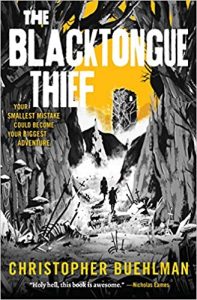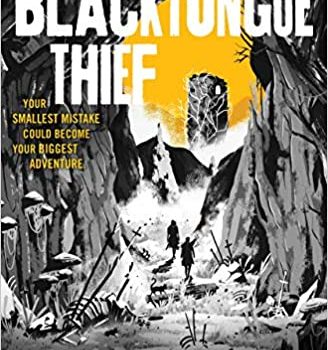Paul Di Filippo and Adrienne Martini Review The Blacktongue Thief by Christopher Buehlman
 The Blacktongue Thief, Christopher Buehlman (Tor 978-1250621191, $25.99, 416pp, hc) May 2021.
The Blacktongue Thief, Christopher Buehlman (Tor 978-1250621191, $25.99, 416pp, hc) May 2021.
Author of five previous novels, Christopher Buehlman had not previously fallen across my radar screen. But certainly my enjoyment of his newest, The Blacktongue Thief, will propel me to search out his earlier books. What he has delivered in this sixth of his tales is a glorious overstuffed “secondary world” fantasy that manages to balance the picaresque mode with that of the (far too often overdone) quest mode; the cosmic with the mundane; comedy with tragedy; the scatalogical with the ethereal; and unmitigated selfishness with noble dedication and altruism. It’s a rollicking ride from start to finish (a finish which is fully satisfying, but open-ended towards sequels), and it’s all contoured, colored and made tangible by the unique narrative voice of our anti-hero, Kinch. (To the best of my awareness, the only famous fictional “Kinch” to date is the POW played by Ivan Dixon in Hogan’s Heroes, and so I don’t think any homage is intended—except insofar as both Kinches are underdog tricksters. In any case, the allusive name certainly can stand a modern-day repurposing.)
We meet Kinch on page one when he’s part of a raggle-taggle band of highwaymen. As a bonafide member of the Takers Guild—the official organization of thieves and other miscreants—Kinch is just pursuing his vocation, albeit at a low point in his life. (He owes his Guild some large dues, and there will be dire penalties indeed if he can’t pay the next installment.) Unfortunately, Kinch & Company make the mistake of attacking a female warrior who dispatches them all without even breathing hard. She is aided, I might add, by a giant battle crow, which is summoned magically from a kind of interdimensional waiting room whenever needed.
Kinch survives the fray, but then receives a surprising assignment when he reports to his Guild masters: he must accompany this scary, humorless and deadly woman, Galva, to the far province of Wostrim, where she intends to rescue a captured princess of her homeland, Ispanthia. The Takers want a part of the action resulting from this mission.
What Kinch does not realize at the moment, but will soon learn, is that his bosses, as a failsafe, are assigning a deadly assassin named Sesta to shadow him. By the way, Sesta is concealed in the body of a stray cat that Kinch befriends. It’s not that the two, cat and killer, are identical and just alternately swapping forms. Sesta actually lives inside the cat, just as Galva’s war corvid lives in its owner’s secret realm.
Soon Kinch manages adroitly to get beyond Galva’s natural suspicions and she reluctantly makes a partnership arrangement, realizing that his admitted skills will be of use on the fraught path ahead. Besides being deft with his thievery, glib and a good fighter, Kinch also boasts a little magic, mainly in the form of concentrated luck. (Shade of Niven’s Teela Brown!) And so the pair set out.
An early stop is the house of the witch Deadlegs, who loans them her pert and vivacious apprentice, Norrigal, who wields a mean staff and not a few spells of her own. Soon the trio are encountering goblins, wicked humans, giants, monstrous sea creatures, and no little treachery from the Takers themselves. After some sixty days of adventuring, during which the threesome are knocked about considerably, while taking on and losing other comrades (all vividly limned), they reach Wostrim to find—well, to tell exactly what they discover would be a thoughtless spoilage.
As mentioned, Kinch’s personality—somewhat reminiscent to me of Marvel Comics’s Pip the Troll—is the engine behind the narrative and our enjoyment thereof. He freely admits to all his bad qualities, while often doing things only a better person would do. He’s horny, scabrous, irreverent—yet oftentimes philosophical, wistful and intellectually inquisitive. Paired with the sober and determined Galva, he assumes a parodic stature based on the classic mistress and liege relationship, as in C.J. Cherryh’s debut, Gate of Ivrel. Yet consider his melancholy and romantic paean to Norrigal that opens Chapter 40, to get a more well rounded sense of his nature.
Along with all the great dialogue, character relationships and action comes some fine worldbuilding. Some 1,200 years before Kinch’s day, there was “The Knock,” some indescribable catastrophe that upended the whole world. (Little tidbits, such as the identification of the name Sesta with the literal word for “six,” incline us to suspect that this might be the far future of our own timeline, a nice frisson.) Kinch’s frequent citation of other languages, of mythic figures from history, of the quaint customs of different regions, all add up to some nicely solid venues and cultures and backstory that contribute to our enjoyment. Likewise, Buehlman’s various systems of magic, one of which revolves heavily around living tattoos, are well constructed.
Any fan of the work of K.J. Parker or Robert Redick, or of Walter Jon Williams’s Quillifer books, will find in The Blacktongue Thief a book as audacious and lively as the city of Pigdenay, “city of rain and ashes, city of whores and rashes, capital of kidnaps and ambergris, cradle of half the world’s soot… where the whale blubber and the kraken’s tentacle are grilled and sold across from the hall of lost sailors….”
-Paul Di Filippo
This analogy might feel like a stretch, but bear with me: Christopher Buehlman’s The Blacktongue Thief is the printed version of a song a bard would perform in a rustic tavern long ago. Yes, it has the rhythm of music deep in its bones because Buehlman’s prose skips richly through the English language. But what really makes it feel like bard song is its way of continuously drawing you back in by continually upping the peril the hero finds himself in, so that you buy the singer another beer in order to find out what happens next. When it looks like the audience might wander off, the bard tosses in a kraken, giant, or brawl to pull the crowd back in.
That spirit makes a certain amount of sense. Buehlman is a reasonably well-known renaissance fair performer, and in that space, a performer who can’t keep an audience engaged will soon starve. While The Blacktongue Thief is his first fantasy work, his novel-length horror (The Suicide Motor Club, The Lesser Dead) proves he knows his way around a plot.
And what a plot it is. Kinch Na Shannack, a black-tongued Galt, teams with Galva, a woman on a quest. Kinch belongs to the Takers’ Guild, which is a school of sorts for those who have a talent for thievery. Problem is, Kinch owes the guild some money and they’ve marked him with a face tattoo. In any bar across the land, those who see it can give him a free punch and earn a free beer. Kinch, as you’d expect, would like to retire this particular debt. The Guild makes him an offer and, well, events gallop rapidly out of his control (not that they ever were in his control the first place).
The Blacktongue Thief is as much fun as watching a talented performer who has built his skills to a profitable level work a room. Given that this title is setting up a series, it’ll be interesting to see if there’s more in Buehlman’s brain still to come. My bet is on yes.
-Adrienne Martini
This review and more like it in the June 2021 issue of Locus.
Adrienne Martini has been reading or writing about science fiction for decades and has had two non-fiction, non-genre books published by Simon and Schuster. She lives in Upstate New York with one husband, two kids, and one corgi. She also runs a lot.
 While you are here, please take a moment to support Locus with a one-time or recurring donation. We rely on reader donations to keep the magazine and site going, and would like to keep the site paywall free, but WE NEED YOUR FINANCIAL SUPPORT to continue quality coverage of the science fiction and fantasy field.
While you are here, please take a moment to support Locus with a one-time or recurring donation. We rely on reader donations to keep the magazine and site going, and would like to keep the site paywall free, but WE NEED YOUR FINANCIAL SUPPORT to continue quality coverage of the science fiction and fantasy field.
©Locus Magazine. Copyrighted material may not be republished without permission of LSFF.







